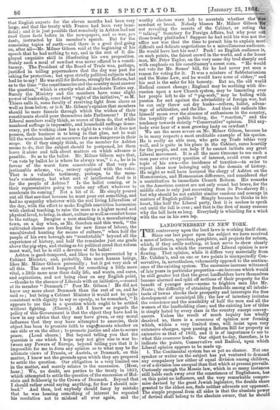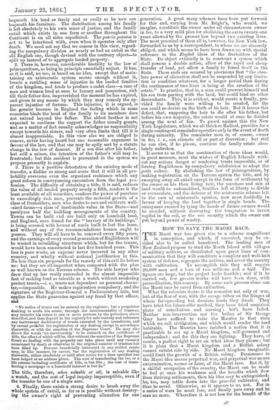LANDOWNERSHIP IN NEW YORK. T HE controversy upon the land laws
is working itself clear. Since our last paper upon the subject we have received a mass of letters, speeches, pamphlets, and projects for reform, which, if they settle nothing, at least serve to show clearly the direction in which the current of Liberal opinion is now flowing. That opinion, while it differs very materially from Mr. Cobden's, and on one or two points is unexpectedly Con- servative, is, nevertheless, vehemently opposed to the continu- ance of the existing system. The enormous increase witnessed. of late years in particular properties—an increase which would be still greater but that the great landholders have themselves become alarmed and split off sections of their property for the benefit of younger sons—seems to frighten men like Mr. Neate ; the difficulty of obtaining freeholds among all inhabi- tants of towns checks their prosperity and interrupts the free development of municipal life ; the law of intestacy irritates the conscience and the sensibility of half the men and all the women of the landholding class; and the existing law of titles is simply hated by every class in the country except convey- ancers. -Unless the result of much inquiry has wholly deceived us, there is a consensus of opinion now forming which, within a very limited time, will insist upon very extensive changes, upon passing a Reform Bill for property as extensive as that of 1832, and it is of importance to see to what this consensus leads. Our object to-day, therefore, is to indicate the points, Conservative and Radical, upon which Liberal opinion appears to be made up. 1. The Continental system has as yet no chance. Not one speaker or writer on the subject has yet ventured to demand. any compulsory law either of equal division among children, or of a division less unequal than that which at present prevails. Curiously enough the Mosaic law, which in so many instances still holds such sway over the consciences of Englishmen, has on this point no influence, and the very remarkable compro- mise devised by the great Jewish legislator, the double share granted to the eldest son, finds neither advocate nor opponent. The simple proposal from all sides is that the absolute power of devisal shall belong to the absolute owner, that he should bequeath his land as freely and as easily as he now can bequeath his furniture. The distribution among his family is left absolutely to his own sense of justice, and the family entail which exists in one form or another throughout the Continent is on all sides repudiated. The patria potestas is not to be interfered with, even when it operates only after death. We need not say that we concur in this view, regard- ing the compulsory division as nearly as bad an entail as the old English one, though devised with the contrary object—to split up instead of to aggregate landed property. 2. There is, however, considerable hostility to the law of primogeniture, as being in principle essentially unjust. It has, as it is said, no use, is based on no idea, except that of main- taining an aristocratic system secure enough without it, breeds a rankling sense of injustice in the landed families of the kingdom, and tends to produce a cadet class—a race of men and women bred at once to luxury and pauperism, rich till their father dies, impoverished the moment he has expired, and given to any means by which they may remedy the ap- parent injustice of fortune. This injustice, it is argued, is the greater because in England the feeling which in some countries binds the head of the family to its members does not extend beyond the father. The eldest brother is not expected to continue the support the father usually grants, and as a matter of fact usually acknowledges no responsibility except towards his sisters, and very often limits that till it is almost inappreciable. In this view also we are obliged to concur, never having heard but one reasonable argument in favour of the law, and that one may be aptly met by a statute change in the law of descent. If a son dies after his father, but still a minor, the intention of the father's will may be frustrated; but this accident is prevented in the system we propose presently to explain. 3. There is a positive detestation of the existing mode of transfer, a dislike so strong and acute that it will in all pro- bability overcome even the organized resistance which any great reform in conveyancing encounters from the legal pro- fession. The difficulty of obtaining a title, it is said, reduces the value of all landed property nearly a fifth, renders it the least available of all securities, confines the power of purchase to exceedingly rich men, prevents the material growth of a class of freeholders, men who desire to own and cultivate well- -sized farms—a class of inestimable value in the State—and paralyzes half the building arrangements of the country. Towns can be built end are built only on leasehold land, and England, once famed for the " bravery of its buildings," is being covered with houses of cards built to last the lease, and without any of the recommendations houses ought to possess. They will all have to be renewed every fifty years, and the earnings of every second generation of Englishmen w ill be wasted in rebuilding structures which, but for the tenure, would have been constructed to last five hundred years. This loss is pure waste, an expense never incurred in any other country, and wholly without national justification in this. No less than six proposals for the remedy of this evil lie before us; but they are all imperfect when compared with the plan so well known as the Torrens scheme. The able lawyer who drew that up has really succeeded in the almost impossible feat of making land as saleable as a watch without rendering perfect trusts,—i. e., trusts not dependent on personal charm- ter,—impossible. He makes registration compulsory, and the signature of the Registrar-General a Parliamentary title, but applies the State guarautee against any fraud by that officer, and
" No notice of trusts can be entered on the register ; but a proprietor desiring to settle his estate, through the instrumentality of trustees, may transfer his estate to one or more persons by the procedure above described, and then deposit in the registry for safe custody and reference any instrument declaratory of trusts executed by the transferees, and by caveat prohibit the registration of any dealing except in accordance therewith, or with the sanction of the Supreme Court. He may also direct the words no survivorship' to be entered on the certificate of title, the effect of which will be, that without the sanction of the Supreme Court no dealing with the property can take place until any vacancy occasioned by death or otherwise in the original number of trustees has been filled up. Persons beneficially interested in any settled estate may, in like manner, by caveat, bar the registration of any dealing therewith, either absolutely or until after notice for a time specified has been lodged at an address given. The cost of transferring the fee, or a life estates including certificate of title, is but 30s.; the cost of trans- ferring a mortgage or a leasehold interest is but 5s."
The title, therefore, when saleable at all, is saleable like a watch, and the cost of legal inquiry imperceptible, even if the transfer be one of a single acre.
4. Finally, there exists a strong desire to brush away the whole system of entail, so far as is possible without destroy- ing the owner's right of preventing alienation for one generation. A great many schemes have been put forward for this end, varying from Mr. Bright's, who would, we imagine, constitute the owner under all circumstances owner in fee, to a very mild plan for abolishing the extra twenty-one years allowed by the present law beyond two existing lives. The most practical of them all is, however, the Now York law, forwarded to us by a correspondent, to whom we are sincerely obliged, and which seems to have been drawn up with special reference to the English ideas of the freeholders of the State. Its object evidently is to construct a system which shall possess a double action, allow of the rapid and cheap transfer of land, yet allow a family to found itself in the State. These ends are secured by provisions that " the abso- lute power of alienation shall not be suspended by any limita- tion or condition whatever, for a longer period than during the continuance of two lives in being at the creation of the estate." In practice, that is, a man could prevent himself and his son from parting with the land, but could bind no other descendants. This, it is evident, would create a family, pro- vided the family were willing to be created, for the son could re-devise on the birth of his heir. But it leaves this defect, that, supposing the heir to die after his father, but before his own majority, the estate would at once be divided among the next of kin. To guard against this the New York Legislature, which we all think so Radical, provides for a single contingent remainder operative only in the event of death during minority. The remainder man is, of course, owner in fee, i. e., can alienate all or part at discretion ; but still he can also, if he please, continue the family estate abso- lutely unbroken.
It seems to us that the combination of these ideas would, in great measure, meet the wishes of English Liberals with- out any serious danger of rendering trusts impossible, or of forcing Englishmen by compulsory subdivision to adopt the petite culture. By abolishing the law of primogeniture, by making registration on the Torrens system the title, and by sweeping away all entail except in the form of settlement by the owner on his then living heir, the purchase and sale of land would be enfranchised, families left at liberty to divide or accumulate, and the defence of the aristocratic scheme left to the care of aristocratic opinion, now most decidedly in favour of keeping the land together in single hands. The annoyance created by tying the hands of future owners would be avoided, without destroying the temptation to invest capital in the soil, as the one security which the owner can put beyond power of wastry.



































 Previous page
Previous page